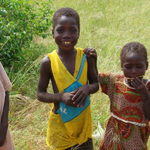


Helen Keller International, Inc.
Mali
3/2006—3/2010
In the sorghum and millet zones of West Africa, the prevalence of iron and zinc deficiencies is high as a result of peoples’ increasing dependence on a solely plant-based diet. Micronutrient sufficiency is harder to achieve in vegetarian diets since the micronutrients present in plants generally have low bioavailability. Iron and zinc deficiencies have extremely devastating effects on human health. Iron deficiency increases maternal and infant mortality and has adverse effects on cognitive abilities and the ability to do productive work. In Mali, there is a high incidence of anemia in both women of reproductive age (63%) and children 6-59 months of age (88%). Rates of iron deficiency anemia may also be used as suggestive evidence of the risk of zinc deficiency, which is associated with impaired growth, immune and neurocognitive functions. The challenge is how to address micronutrient deficiency problems using affordable, locally available sources.The project will conduct a household level survey and analysis of the entire food system in the target communities to improve understanding of the critical determinants of nutritional status and to identify locally available food resources and/or superior food processing/preparation practices that would help improve micronutrient sufficiency in particular and nutrition in general.
The goal of this project is to improve iron and zinc nutrition in sorghum and millet based cropping zones of Mali by:1. Carrying out a survey that will lead to an improved understanding of the factors that contribute to poor zinc and iron nutrition and to the identification (and subsequent promotion) of opportunities to exploit locally available food resources and practices that would help mitigate the problem.2. Analyzing the zinc and iron content of locally available food stuffs to identify nutrient dense foods and/or foods that may enhance or inhibit micronutrient uptake.3. Carrying out nutrition education and promotion of specific useful interventions in the target communities.
